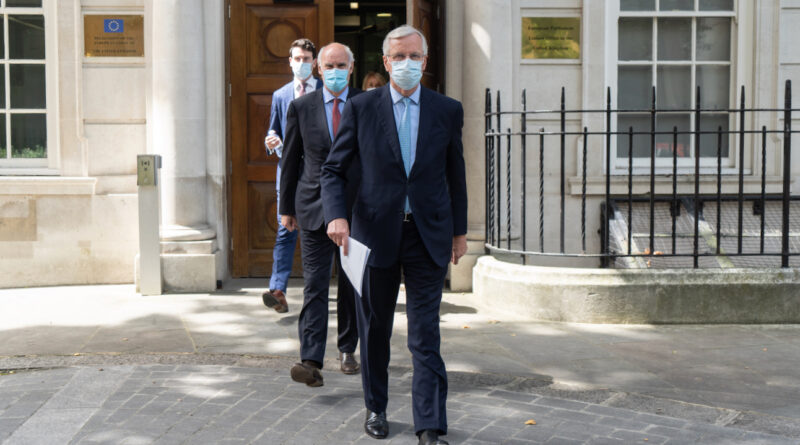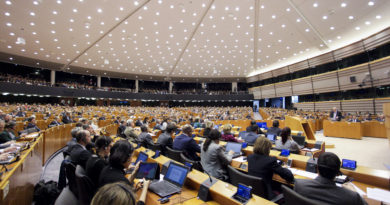Who will protect citizens’ rights if the UK government flouts Brexit commitments?
The UK government has sent shock waves across Europe as it announced plans to break part of the promises made under the agreement on the withdrawal from the European Union, signed just eight months ago. The move concerns the part of the deal about Northern Ireland.
Campaigners from the3million and British in Europe, who defend the rights of EU citizens in the UK and Britons in the EU, have reacted with dismay at the news. They say since the announcement they have been inundated with “anxious enquiries” about the impacts for the citizens’ rights chapter of the agreement.
A deliberate breach of international law
Speaking in the House of Commons, Northern Ireland Secretary of State Brandon Lewis confirmed on Tuesday that the British government intended to breach the terms of the Northern Ireland Protocol attached to the withdrawal agreement “in a very specific and limited way”.
The Internal Market bill, published the next day, delivered on that promise. If passed as it is, it will allow UK ministers to not apply the required checks on some goods moving between Great Britain to Northern Ireland, and limit the scope of EU state aid rules in the region.
These provisions were included in the withdrawal agreement to avoid checks at the border between Northern Ireland and the Republic or Ireland, now an external EU border.
The EU’s ultimatum
In response to the move, the European Commission called for an urgent meeting of the EU-UK joint committee that oversees the implementation of the withdrawal agreement.
An unusually direct statement by EU Commission Vice-President and co-chair of the committee Maroš Šefčovič followed on Thursday.
The statement said that if the bill were to be adopted in the current format, it would constitute an “extremely serious violation of the withdrawal agreement and of international law”. The Commissioner called on the British government to remove from the bill the controversial measures “in the shortest time possible and in any case by the end of the month.”
The agreement contains “mechanisms and legal remedies” to address violations of the deal which “the European Union will not be shy in using,” the Commission added.
The EU executive also said that putting such measures forward “seriously damaged trust between the EU and the UK” and “put at risk the ongoing future relationship negotiations.”
Commission President Ursula von der Leyen had already said that complying with the withdrawal agreement was a “prerequisite for any future partnership”.
The President of the European Parliament, which will have to ratify the future EU-UK agreement, added: “We fully expect the UK to honour the commitments that it negotiated and signed up to last year – especially with regard to citizens’ rights and Northern Ireland”.
The leaders of all European Parliament’s political groups further announced that if UK authorities will breach the withdrawal agreement, the Assembly will not ratify any future deal.
France and Germany declared the UK breach of international law “unacceptable”, a message repeated in an unconventional message by Andreas Michaelis, the German Ambassador to the UK.
EU Chief negotiators Michel Barnier reconfirmed the EU’s intention to reach “an ambitious future partnership with the UK”.
“Nobody should underestimate the practical, economic and social consequences of a ‘no deal’ scenario,” Barnier added.
A game of poker
It is unclear whether the UK government wanted to shake up Brexit negotiations, which have been stalling over the summer, or is aiming for no deal.
But the possibility that the withdrawal agreement could be unilaterally contravened raised the alarm of the people it is meant to protect.
“The statement in the House of Commons and the published bill send a clear message to the EU that if the UK does not intend to honour one critical part of the withdrawal agreement, it cannot be trusted to implement other parts of the agreement, including on citizens’ rights,” the3million and British in Europe said.
The two organisations asked Prime Minister Boris Johnson to “make an urgent statement” in parliament to confirm that the UK will “honour its obligations towards EU nationals in the UK and its own citizens living in the EU.”
EU citizens in the UK fear a gradual erosion of their rights, as it has happened with the Windrush generation. After the Second World War, citizens from the Commonwealth were invited to Great Britain to support the reconstruction. But over time, new rules have led to their loss of citizenship and residence rights, family separations and deportations that are still taking place today.
As for Britons in the EU, they fear retaliation measures from EU governments, as several EU member states are yet to disclose plans to implement the withdrawal agreement and secure their rights. France, for instance, is expected to open the new residency system for UK nationals in October.
Campaigners have called on EU countries to “stand by their obligations” to British residents and to “reaffirm the importance of the rule of law”.
The groups recalled that after the Brexit referendum, ex-Prime Minister Theresa May refused to automatically confirm the rights of EU citizens living in the UK and UK citizens in the EU. The lives of these 5 million people have then been in a legal limbo until the withdrawal agreement was ratified in January.
“With this simple but devastating statement in the House of Commons and the publication of the draft bill, all certainty has vanished,” the organisations now say.
So what are the safeguards against breaches of the withdrawal agreement?
Resolving EU-UK disputes
During the Brexit transition period (until 31 December 2020), and for the following 8 years when it comes to citizens’ rights, the Court of Justice of the European Union will continue to have jurisdiction in the UK.
For disputes arising after the end of the transition, the EU and the UK have to seek solutions within the joint committee. Under this committee, a specialised committee supervises specifically citizens’ rights and another one the implementation of the Protocol on Northern Ireland.
If no solution is found within the joint committee, the two sides can set up a panel of five arbitrators, who will issue binding decisions.
If decisions are not complied with, there are mechanisms to continue the arbitration process with potential penalties and sanctions, including the suspension of the obligations deriving from the withdrawal agreement. But citizens’ rights provisions can never be suspended, notes Steve Peers, Professor of European human rights law at the University of Essex.
Parallel cases can also be brought under national and EU courts, Professor Peers writes.
In the most extreme scenario, the withdrawal agreement provisions are also protected under the Vienna Convention of the Law of Treaties, according to experts cited in The Guardian.
An independent monitoring authority
The practical implementation of the citizens’ rights commitments will be monitored by the European Commission in the 27 EU countries and by an Independent Monitoring Authority in the UK.
The Authority has to be appointed by the end of the transition period and the Ministry of Justice is currently recruiting the chair.
The Authority will have to ensure that persons are not prevented from exercising their rights, identify potential breaches of the deal, and conduct inquiries in response to requests or on its own initiative.
Should negotiations on the future relationship break down, the withdrawal agreement and its safeguards will therefore remain in place. But a hostile atmosphere may surround their implementation.
Claudia Delpero © all rights reserved.
Photo by Niklas Halle’n © European Union, 2020. Source: EC Audiovisual Service.
Europe Street News is an online magazine covering citizens’ rights in Europe. We are fully independent and we are committed to providing factual, accurate and reliable information. We believe citizens’ rights are at the core of democracy and information about these topics should be accessible to all. This is why our website and newsletter are available for free. Please consider making a contribution so we can continue and expand our coverage.





